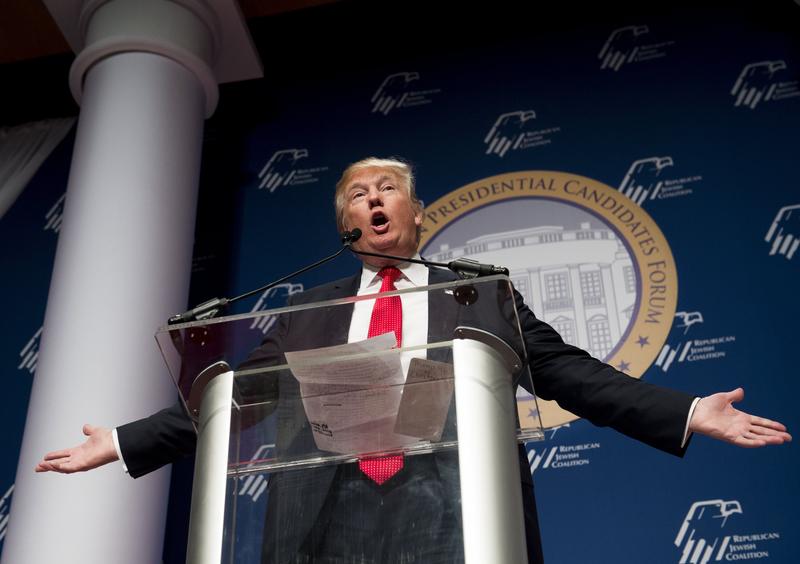
Donald Trump’s staying power in the Republican primary for president is exciting voters around the country — and scaring the Grand Ole Party’s establishment. WNYC’s Matt Katz has just returned from a reporting trip to New Hampshire, home of the first primary on February 9th, and he joined All Things Considered host Jami Floyd to discuss the Trump phenomenon.
You attended Chris Christie events and a Trump rally. What's the difference?
Christie and Trump events couldn’t be more different. At a Christie town hall, I walked into a firehouse and just started talking to people before Christie arrived. No problem. At Trump’s rally, my microphones were given the once over by bomb-sniffing dogs and the Secret Service. And then I could only talk to attendees for a few minutes before reporters were separated off into this guarded, fenced-in press area. And unlike Christie, who name-dropped Middle Eastern leaders and gave specifics about reforming Social Security and whatnot, Trump is all broad strokes. For example, he talks about being the best president for veterans — period. And then he makes just seemingly random statements like, "Hispanics are fantastic people." Or, "that guy in the crowd is really good looking." There’s also falsehoods, like repeating, again, the debunked accusation that Muslims in Jersey City celebrated 9/11. That got applause.
There's another thing about these events — they are much more diverse than Christie’s. Not in terms of race — the crowd was basically all white — but in terms of age: young and old, professional and blue collar. Really nice people just genuinely thrilled to be there. Jodi LaBoffa, a mother of two, cried after Trump signed her poster. She drove three hours to see him.
"It was like seeing a rock icon, and I just love him so much, and he commented on the pin I was wearing," she said. "And when I saw him, he spotted me and he signed [the poster], and I said 'I love you.' And he looked back at me and said, 'I love you too.' Each person matters to him."
Trump as a man of the people. Were all of the attendees Trump super fans?
No. It seemed to be split between two different groups of people. Some were just there for the show. The theater. I met a few college students who said they were there as a learning experience, and a liberal high school English teacher who brought his students, who like Bernie Sanders. That makes me think Trump’s support is thinner than it may seem on the surface.
Everyone else loves Trump for the way he talks. They think that among the biggest problems in the country is political correctness run amok. One man told me he favored the First Amendment and he thinks Trump is the only one not afraid to say the truth. That man didn’t find it ironic, by the way, that Trump bans certain reporters from his rallies.
Some of these people also echo Trump's controversial statements. I met a 33-year-old grocery store supervisor, Sarah Hanchett, who brought her 6-year-old daughter. It was her seventh time seeing Trump. I asked what positions of his she supported. She cited terrorism, building a wall on the Mexican border and "keeping the Muslims out."
Comments like that concern some Republicans. The Washington Post obtained a document from the Republican Senate Campaign Committee on how the GOP establishment should deal with Trump, and The New York Times recently reported on how party elders are figuring out a stop Trump plan.
Some Republicans are worried because polls show Trump is unpopular among women and minorities. And that’s a problem in an increasingly diverse America. There’s a fear that things he says about certain demographic groups are a stain on the party, not just for winning the White House but for Republicans keeping control over Congress. For example just this afternoon he made a speech before the Republican Jewish Coalition with a series of stereotypical comments about Jews. That led to headlines about him making an anti-Semitic speech.
This probably won’t hurt Trump in the short-term, but it could hurt Republicans in the long-term. We’re starting to see mentions of the Barry Goldwater presidential candidacy in 1964. The historical analysis is that he was too conservative for the country at the time, and his presence on the ballot caused not just a Republican presidential loss, but a loss of 36 GOP seats in Congress.
